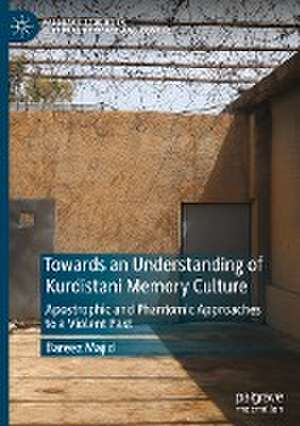Towards an Understanding of Kurdistani Memory Culture: Apostrophic and Phantomic Approaches to a Violent Past: Palgrave Studies in Cultural Heritage and Conflict
Autor Bareez Majiden Limba Engleză Hardback – 21 dec 2023
Din seria Palgrave Studies in Cultural Heritage and Conflict
- 20%
 Preț: 568.11 lei
Preț: 568.11 lei - 15%
 Preț: 696.68 lei
Preț: 696.68 lei -
 Preț: 415.77 lei
Preț: 415.77 lei - 18%
 Preț: 780.19 lei
Preț: 780.19 lei - 15%
 Preț: 589.33 lei
Preț: 589.33 lei - 18%
 Preț: 737.57 lei
Preț: 737.57 lei - 15%
 Preț: 594.24 lei
Preț: 594.24 lei - 18%
 Preț: 786.84 lei
Preț: 786.84 lei - 18%
 Preț: 949.42 lei
Preț: 949.42 lei - 18%
 Preț: 733.03 lei
Preț: 733.03 lei - 18%
 Preț: 901.11 lei
Preț: 901.11 lei - 18%
 Preț: 792.34 lei
Preț: 792.34 lei - 20%
 Preț: 767.40 lei
Preț: 767.40 lei - 15%
 Preț: 588.18 lei
Preț: 588.18 lei -
 Preț: 233.58 lei
Preț: 233.58 lei - 18%
 Preț: 726.06 lei
Preț: 726.06 lei -
 Preț: 380.45 lei
Preț: 380.45 lei -
 Preț: 386.39 lei
Preț: 386.39 lei - 18%
 Preț: 777.69 lei
Preț: 777.69 lei - 18%
 Preț: 784.13 lei
Preț: 784.13 lei - 18%
 Preț: 894.79 lei
Preț: 894.79 lei - 18%
 Preț: 725.13 lei
Preț: 725.13 lei -
 Preț: 484.47 lei
Preț: 484.47 lei -
 Preț: 385.84 lei
Preț: 385.84 lei - 15%
 Preț: 640.71 lei
Preț: 640.71 lei -
 Preț: 390.25 lei
Preț: 390.25 lei -
 Preț: 388.13 lei
Preț: 388.13 lei -
 Preț: 385.84 lei
Preț: 385.84 lei
Preț: 730.97 lei
Preț vechi: 891.43 lei
-18% Nou
Puncte Express: 1096
Preț estimativ în valută:
139.86€ • 146.05$ • 115.50£
139.86€ • 146.05$ • 115.50£
Carte tipărită la comandă
Livrare economică 15-29 aprilie
Preluare comenzi: 021 569.72.76
Specificații
ISBN-13: 9783031375132
ISBN-10: 3031375130
Pagini: 308
Ilustrații: XVIII, 308 p. 21 illus.
Dimensiuni: 148 x 210 mm
Greutate: 0.54 kg
Ediția:1st ed. 2023
Editura: Springer International Publishing
Colecția Palgrave Macmillan
Seria Palgrave Studies in Cultural Heritage and Conflict
Locul publicării:Cham, Switzerland
ISBN-10: 3031375130
Pagini: 308
Ilustrații: XVIII, 308 p. 21 illus.
Dimensiuni: 148 x 210 mm
Greutate: 0.54 kg
Ediția:1st ed. 2023
Editura: Springer International Publishing
Colecția Palgrave Macmillan
Seria Palgrave Studies in Cultural Heritage and Conflict
Locul publicării:Cham, Switzerland
Cuprins
1. Introduction: Kurdistani Memory Culture.- 2. Master Narratives: Kurdistani Memory Culture and Educational Textbooks.- 3. Resisting Master Narratives: Kurdistani Memory Culture and Two Literary Texts by Bachtyar Ali.- 4. The Apostrophic: Amna Suraka, In Order Not to Forget.- 5. The Phantomic: The Halabja Monument and Peace Museum.- 6. Conclusion: Memory as an Agent of Change.
Notă biografică
Bareez Majid holds a PhD in Cultural Studies from Leiden University, and is currently an affiliated fellow at Heidelberg University. She specializes in memory, trauma, museums, and literature, with a specific focus on the Kurdistan Region of Iraq. Majid co-authored the 2022 book Exploring Hartmut Rosa’s Concept of Resonance.
Textul de pe ultima copertă
This book presents a thorough analysis of the Kurdistan Region of Iraq’s memory culture, focusing particularly on commemorations and representations of the Anfal and Halabja atrocities. The author employs a transdisciplinary approach that draws on Memory Studies, Postcolonial Studies, Heritage Studies, Kurdish Studies, Literary Studies and Trauma Studies, to analyze cultural objects such as Kurdistani literary novels, museums, and school curricula. The book introduces two key concepts: the "phantomic museum" and the "apostrophic museum." The former explores the fragile and politicized nature of memories of missing individuals who disappeared during Saddam Hussein's genocidal campaigns and who have never been found, primarily as they return in the Halabja Monument and Peace Museum. The latter examines how the addressing – apostrophizing – of Kurdistan, in and by the Amna Suraka museum in the city of Sulaymaniyah, institutionalizes “official” and highly politicized versions of the past.
Caracteristici
Provides unique insights into the KRI’s memory culture Develops original concepts: the apostrophic and the phantomic museum Ingeniously combines various academic disciplines
